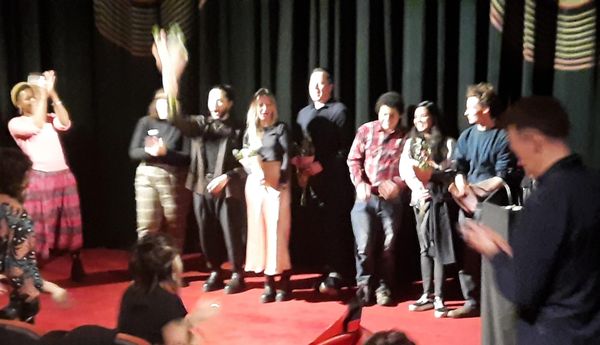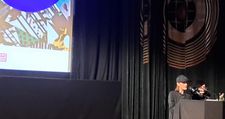 |
| Award winners and jurors at the Glasgow Short Film Festival Photo: Andrew Robertson |
Glasgow's 16th Short Film Festival has been an exciting return to form. While last year's saw the return of audiences after coronavirus restrictions were lifted, the festival's Programme Director Sanne Jehoul talked in her opening remarks at the closing ceremony about how this felt like things had properly bounced back. It was "very noticeable" that "people showed back up." Before she and Festival Director Matt Lloyd carried on, however, they announced a bit of off-screen drama.
The festival's had an exciting time. Several judges from the competition had to return early to avoid strike action in the German aviation sector. One of the event venues, the Centre for Contemporary Arts, was picketed by the IWW after staff at the venue's subcontracted/tenanted café were sacked for labour organising. The situation itself is complex, but it's also indicative of wider issues across the Scottish Arts Sector. One of the many thanked by name was marketing manager Natalie Peteranna, with Lloyd explaining that the festival "only got her because of the collapse of Filmhouse" and that she was going to a "better job... than [GSFF] could give her." In and amongst that it appeared that voting in the Scottish Audience Award was disrupted, whatever the mechanism it was described as "interference with voting" that apparently meant some couldn't vote. Audiences will be contacted later in the week of the 27th and given the opportunity to vote again, with the winner announced some time later.
 |
| SODA JERK presenting at the GSFF closing ceremony Photo: Andrew Robertson |
In the interim, and before a timetabled "organic chat about how it's gone", there was an announcement of the Duncan Cowles Prize for Best Duncan Cowles Film. That level of self-referentiality is in and of itself an homage to Cowles filmography, his Directed By Tweedie won at the 2015 edition. Even more typically the inaugural 'winner' was SODA JERK. Their Terror Nullius was the gala opening back in 2019, and the tradition of the first screening at a short film festival being a feature persisted, this year opening with OMOS. SODA JERK's latest Hello Dankness was screened to a packed theatre on Saturday night, and if one charitably considers its various acts as separate films and notices how conveniently they add up to 90 minutes then it could probably claim to be a shorts programme by itself.
As that "organic chat" continued to develop like a one-act play about waiting for arts funding, the distinction between scripted opening and spontaneous remarks was highlighted by a digression about the number of "really hot people" attending the festival. Some of this might have been delerium, it is no easy thing to organise an event with this moving parts. Even as the staff and this year's 42 volunteers were thanked, it emerged that things had run sufficiently smoothly that on Saturday Lloyd had been able to "cycle to Rutherglen to pick up some CDJs." Fumes from the Glasgow Southern Orbital may have had a greater effect than the products of drinks sponsors Illicit Spirits and Overtone Brewing whose products would be "fuelling tonight in the only way that'll see us through". There was also talk of a delegate visit to Clydeside Distillery, which appeared (or at least sounded) like it had been popular with some in the audience.
After meandering through sex, alcohol, cash (including new event funders The British Council and Glasgow Life), a brief meditation on death included a correction as Lloyd realised someone else would have to "chip" an epitaph onto a tombstone for him. It might seem unkind to highlight, but he was at the time talking about the quotes attributed to him in coverage of the festival. It's for a diversity of viewpoints that the festival rightly thanked its selection panels (who trawl through thousands of submissions) and their board of trustees who "keep the ship on the narrow". I'll say that last wasn't a deviation from Bristol-fashion but a consequence of festival venue Civic House's proximity to the canal. It's undergone a genuine transformation over the five years GSFF have made use of it, including serving as location fo two festival trailers. The walls may no longer drip on both sides, and the food and coffee offerings may be miles better, but it still fulfills a vital function of arts venues by having chairs that are noisier than they are uncomfortable.
Once through that business, and with the audience in good spirits, the first awards were announced. There are two prizes for Young Scottish Film-maker, one for works made with formal support and one for works made without. The juries are made up of those whose works were shortlisted the previous year. Those shortlisted get £200 and the winners receive £1000 and ongoing support for film-making. Films are selected by programmers at Glasgow Film Festival, Short Film Festival, and Eden Court. Winning for works without support was Practice by Jack Hayden. Praised for "creativity within constraints," its comedy predicated upon isolation and awkwardness clearly amused the audience. Though unable to attend, we were told he'd be "absolutely over the moon" with his win. Winning for works with support was Sayee Gogata's My Name Is Beth. A heartwarming story of found (and lost) family and memory, it was praised for its use of "a fantastic location and... cast." Gogata had presumably spoken at the screening the day before, as she started her thanks with "twice in two days," saying that she'd "run out of interesting things" and "hoped that [we] like[d] the film." It's safe to say we did. The awards were presented by previous shortlisted film-makers Ciara Flint, Joe Osborne and Sean Soaul.
The jury for the Scottish Award was made up of three, Anna Gaschutz, Adura Onashile, and Julie Rousson. Onashile 'did the double' with Expensive Shit at the 2021 GSFF, and her feature début screened at this year's Glasgow Film Festival. Gaschutz and Rousson are both festival programmers, associated with (among others) Locarno and Clermont-Ferrand festivals. Gaschutz was one of those who had to change travel plans, so the award was presented by Onashile and Rousson. Describing the selection as "really really impressive," "exciting," and with Onashile declaring that as represented "the future of Scottish film is going to be glorious," it was clear they'd had some hard choices to make. While "every film felt like the maker was pushing themselves," Rousson added that deliberation had been interesting. She added that they'd "talked about all the films, which is not always the case, let's be honest."
They gave special mention to The Mobius Trip, praising it for its "strong impact" with its "radicalism," talking about its "adventurous cinematic [ambition]". They were excited by the potential it represented. Writer/director Simone Smith said she was "really grateful to have this." Going on to talk about the winner, the judges talked about celebrating a film that was "fearless," "rigorous," "honest," surprising with its "lightness of touch," its willingness to "subvert the normal gaze" and focus on the "detail of a relationship." They further praised Miranda Stern's Clean as "film-making at its most urgent, dynamic, heart-breaking [and] liberating." Stern was unable to attend, but producer Reece Cargan had asked her to prepare remarks just in case. Even as he was delivering those he received a voice note from her, which was played over the microphone. She was effusive in her thanks, sorry she wasn't there, and when she said she "felt like crying" even at the technical removes the emotion was clear. This was also the case in the film itself, and even without an earlier jape about Cowles the incredibly personal nature and multi-camera process of Stern's film would have reminded me of that work. It's an astonishing piece of documentary.
The final awards of the evening were the Bill Douglas and audience awards for international film. Catherine Colas, Nicolas Khabbaz, and previous winner Pavel Mozhar (Handbook) were all unable to attend, also affected by issues with flights and so having left early. In their stead SODA JERK presented, describing it as "an honour" to do so. The jury had given a special mention to Rita Barbosa's 2nd Person, highlighting it for not allowing a simplified classification. The award itself went to 45th Parallel, noting its "coherent dramaturgy" and "precise" construction. Lawrence Abu Hamdan had provided an acceptance message by video, whispered from an airport lounge. That location and tone both incredibly appropriate, and given the quality the thanks he offered to his team were clearly heartfelt and deserved. Among the many to declare strong feelings for Glasgow, he explained he'd had his first exhibition in the city back in 2007. Saying that they had only had a day and a half to film in what is a complicated location, he praised producer Luke Moody for his "complete unwillingness to accept the word no."
A lack of compromise also informs the audience award winner, Jorge Cadena's Flores Del Otro Patio. He was effusive in his thanks, glad that the audience had "really connected" with his film. He explained that he'd "made [the film] without money," bouyed by the "energy from [those] of Barranquilla," borrowing "their urgency." He also thanked his husband. There was a knowing laugh from most of the audience as he admitted "it's sometimes hard to live with a film-maker." It's probably slightly easier than living with a film critic, admittedly, as at least you can sometimes get them off the sofa.
That said, Eye For Film did get along to several events and screenings despite complexity, and may have overtaken said heart-eyed festival director on his stereo-equipped velocipede while trying to score a returned ticket for SODA JERK's sold-out show while on a slow train from Bathgate. Never let it be said there isn't glamour to spare in short film, I even had time to change from one Star Wars t-shirt to another. We'll have ongoing reviews and further coverage from GSFF and Venice's Ca'Foscari festival which ran this same weekend, including, when we know it, the audience award.





















